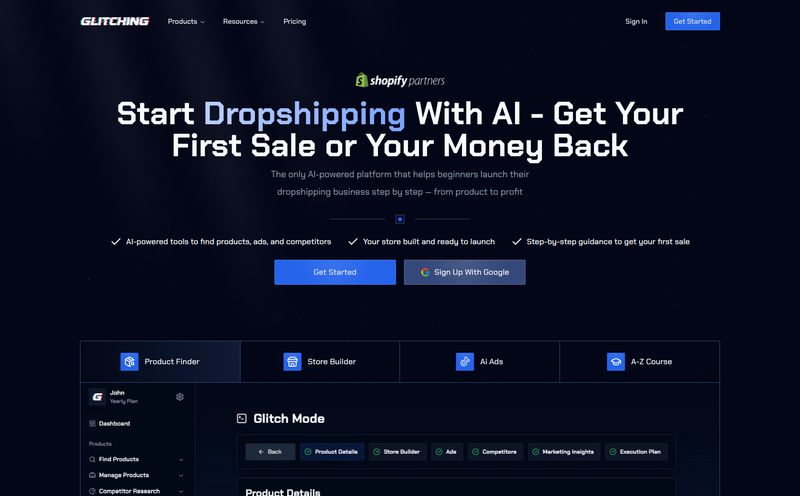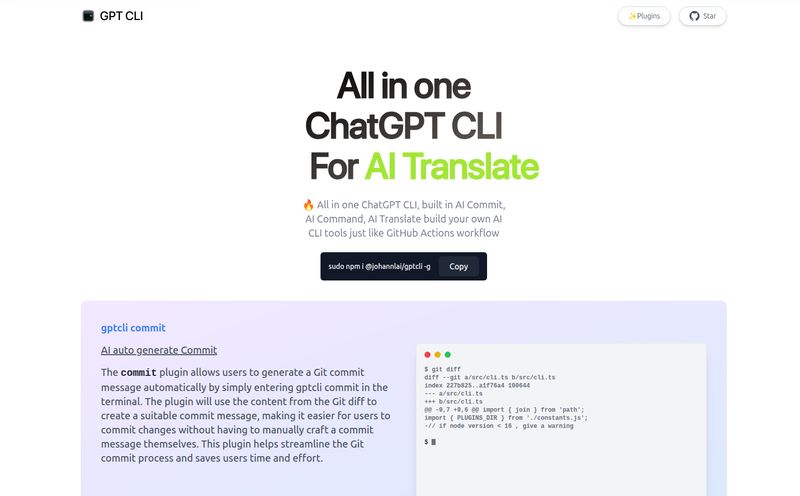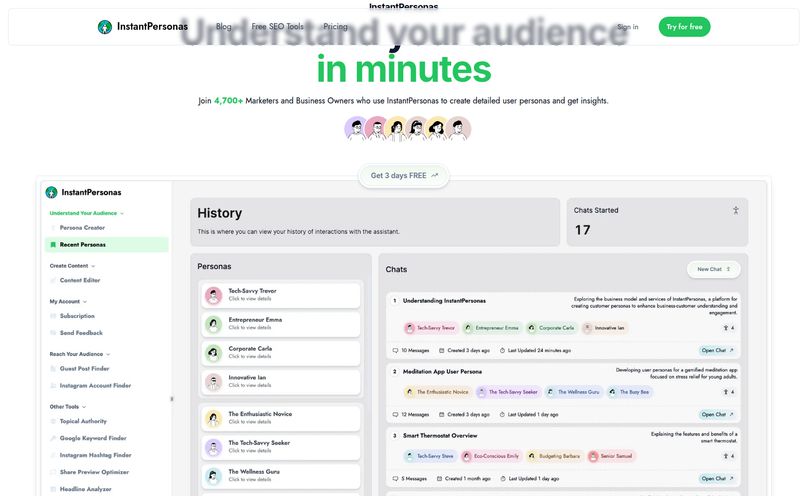If you're in developer marketing or DevRel, your life is a constant juggling act. You’re supposed to be writing killer tutorials, updating documentation, cranking out blog posts that actually help people, and maybe, just maybe, getting a few hours of sleep. The content treadmill never stops. For years, the promise of AI content tools has been dangling in front of us, but most of them... well, they produce generic, soulless fluff. They don't understand your API, they can't explain a complex SDK, and they definitely can't read your team's collective mind (which lives in your internal wiki and GitHub repos).
It’s a huge pain point. You spend more time correcting the AI than it would've taken to just write the dang thing yourself. So when I heard about Cortex Click, I was skeptical. Another LLM-driven platform? Great. But then I looked closer. It claimed to generate content grounded in your own docs, GitHub repos, and wikis. Now that got my attention. It’s not about asking a generic AI about a general topic; it’s about asking an AI that has studied your specific product. A pretty compelling pitch, right?
So What Exactly Is Cortex Click?
Think of it less as a writer and more as an incredibly fast, highly focused research assistant and first-draft machine. Cortex Click is an LLM-driven platform designed specifically for creating high-quality developer marketing content. The magic isn't just in the language model; it's in the ingestion. You connect it to your sources of truth—your technical documentation, your codebase on GitHub, your internal Confluence or Notion pages—and it indexes everything.
Suddenly, the AI isn't guessing. It's referencing. It’s like giving a new hire a login to all your internal systems and telling them to have a first draft of a blog post on your desk by morning. Except this new hire has read everything. Instantly. And doesn't need coffee. This process of using your own data is often called Retrieval-Augmented Generation (RAG), and it’s the key to producing relevant, accurate technical content.
The Core Abilities That Actually Matter
A lot of platforms boast a million features, but you only ever use two of them. With Cortex Click, the focus is refreshingly tight and built around what technical teams actually need.
Grounded Content Generation
This is the main event. You can prompt Cortex Click to write blog posts, tutorials, and even landing page copy based on the knowledge it has indexed. For example, you could ask it to “Write a getting-started guide for our new XYZ-API, based on the internal readme and the examples in the main GitHub repo.” The output isn't a generic listicle; it's a structured article that pulls from your actual source material. Of course, it's not perfect (more on that later), but as a starting point? It’s a massive accelerator.
Your Knowledge, Indexed and Managed
The real power lies here. The platform's ability to sync with your existing knowledge bases is its biggest differentiator. It’s one thing for an AI to know about Python in general; it’s another for it to know about your specific Python library, including its quirky dependencies and the one function that always trips people up. By indexing your internal wikis and public-facing docs, you create a private brain for your marketing efforts.

Visit Cortex Click
Interactive Q&A Copilots
This was a feature that genuinely intrigued me. Beyond static articles, you can create a “copilot”—an interactive Q&A bot for your website. Imagine a user landing on your docs and instead of CTRL+F-ing through pages, they can just ask, “How do I handle authentication tokens for a service account?” and get a direct, accurate answer pulled from your documentation. It’s a massive upgrade for user experience and can seriously cut down on repetitive support tickets. This is content that does something, not just sits there.
Who Is This Really For?
I’ve seen a lot of tools that try to be everything to everyone. Cortex Click isn't that. It’s got a clear audience in mind.
This is a fantastic tool for:
- DevRel and Developer Marketing Teams: This is the bullseye. Teams that need to produce a high volume of technical content will see an immediate ROI.
- Early-Stage Startups: When you're a small team and your lead engineer is also your head of marketing, a tool like this can be a lifesaver. It lets you punch above your weight in content creation.
- Companies with Robust Documentation: If you've already invested in creating a solid knowledge base, Cortex Click helps you squeeze so much more value out of it. It turns that static library into a dynamic content factory.
It might not be the best fit for:
- Non-Technical Businesses: If your content is about lifestyle, recipes, or general business advice, there are other, more generalized AI tools that would probably suit you better.
- Teams with No Central Knowledge Base: The tool is only as good as the data you feed it. If your documentation is a mess or nonexistent, you'll need to fix that first. Garbage in, garbage out, as they say.
My Experience: The Good, The Bad, and The AI
Alright, let's get down to it. I've spent enough time in this industry to know that no tool is a silver bullet. Cortex Click is powerful, but it's important to go in with the right expectations.
The Time-Saving is Palpable
The single biggest win is speed. The process of researching a technical topic, outlining the post, finding the right code snippets, and structuring it all can take hours, if not days. Cortex Click can spit out a solid, well-structured first draft in minutes. This frees you up to do the high-value work: refining the tone, adding personal insights, and ensuring technical accuracy. It crushes the “blank page” problem.
The Quality is Surprisingly Technical
I was genuinely impressed with its ability to handle technical nuance. Because it's pulling from GitHub and docs, it understands context. It can generate code examples that are relevant and correctly formatted. It’s not just a language model; it's a technical language model once you've trained it on your data. This is something generic tools just can't do well.
A Necessary Word on LLM Reliance
Here’s the reality check. You cannot just press a button and publish the output. Anyone who tells you that about any AI tool is selling snake oil. The content generated by Cortex Click is a fantastic starting point, but it still requires a human in the loop. The LLM can sometimes misunderstand nuance or structure a sentence in a slightly odd way. You are still the expert. Your job shifts from being a pure writer to being a master editor and strategist. This tool is a powerful collaborator, not a replacement for your brain.
Let's Talk Money: Breaking Down Cortex Click Pricing
Pricing is always a huge factor, and Cortex Click offers a pretty flexible structure that scales with you. They have three main tiers.
| Plan | Price | Best For | Key Features |
|---|---|---|---|
| Pay-as-you-go | $0 /mo + consumption | Individuals or small teams starting out. | 100 credits, 25 articles, 4 users, weekly knowledge base refresh. A great way to test teh waters. |
| Pro | $425 /mo + consumption | Growing teams scaling their content strategy. | 25,000 credits, 100 articles, 10 users, daily knowledge base refresh. |
| Enterprise | Contact for Price | Large organizations needing custom solutions. | Custom everything, plus SSO/SAML, SOC2, and white-glove support. |
The “Pay-as-you-go” tier is a brilliant move. It removes the barrier to entry, letting you sign up and see if it actually works for your workflow without committing to a hefty monthly fee. You only pay for what you use beyond the initial free credits.
The Verdict: Is Cortex Click a Game-Changer?
So, is it worth it? In my opinion, for the right team, absolutely. Cortex Click isn't just another AI writing assistant; it’s a specialized engine that solves a very specific and painful problem for the developer marketing world. It bridges the gap between your deep, internal knowledge and your public-facing content.
It’s not about firing your writers. It's about making them 10x more efficient. It’s about letting them focus on storytelling and strategy instead of the mind-numbing task of collating information. If you're drowning in a sea of content demands and have a solid foundation of technical documentation, Cortex Click could be the powerful current that carries you to shore.
Frequently Asked Questions about Cortex Click
- Can Cortex Click write about topics outside my knowledge base?
- Primarily, its strength is generating content based on the knowledge you provide (docs, GitHub, etc.). While the underlying LLM has general knowledge, the platform is designed and optimized for creating grounded, specific content from your sources to ensure accuracy and relevance.
- How does the 'Q&A copilot' work?
- It creates an embeddable chat interface for your website. When a user asks a question, the copilot searches your indexed knowledge base in real-time to find the most relevant information and provides a direct answer, often with source links back to your documentation.
- Is the content generated by Cortex Click SEO-friendly?
- The structure and content it generates can be very SEO-friendly, as it naturally uses relevant keywords and entities from your own documentation. However, like any content, you'll still want a human to perform final SEO optimizations, like checking keyword density, adding internal links, and optimizing meta tags.
- How much technical skill is needed to set it up?
- The setup process seems designed for a technical audience but is fairly straightforward. It mainly involves connecting your data sources, like authenticating with GitHub or pointing it to your documentation URLs. You don't need to be a developer to use it, but familiarity with these platforms helps.
- Does it publish directly to platforms like WordPress?
- The information suggests it helps you 'publish content to your existing website.' This typically means it provides the content in a format (like Markdown or HTML) that you can easily copy and paste into any CMS like WordPress, Ghost, or Webflow. Direct API-based publishing may be an option, especially on higher-tier plans.
- What's the difference between a 'Cortex' and a 'Catalog' in the pricing plan?
- Based on the terminology, a 'Cortex' likely refers to a distinct AI instance or a workspace for a specific project or product. A 'Catalog' probably refers to a collection of connected knowledge sources (like one GitHub repo + one documentation site). Having more of each allows you to segment content generation for different products or teams within your organization.
Final Thoughts
The future of specialized content creation, especially in technical fields, is undoubtedly a fusion of human expertise and targeted AI. Generic tools will fall short. Cortex Click is a sharp, well-executed example of what this future looks like. It’s a tool built with a deep understanding of its user’s workflow, and for that reason alone, it's worth a serious look for any team in the developer space.



